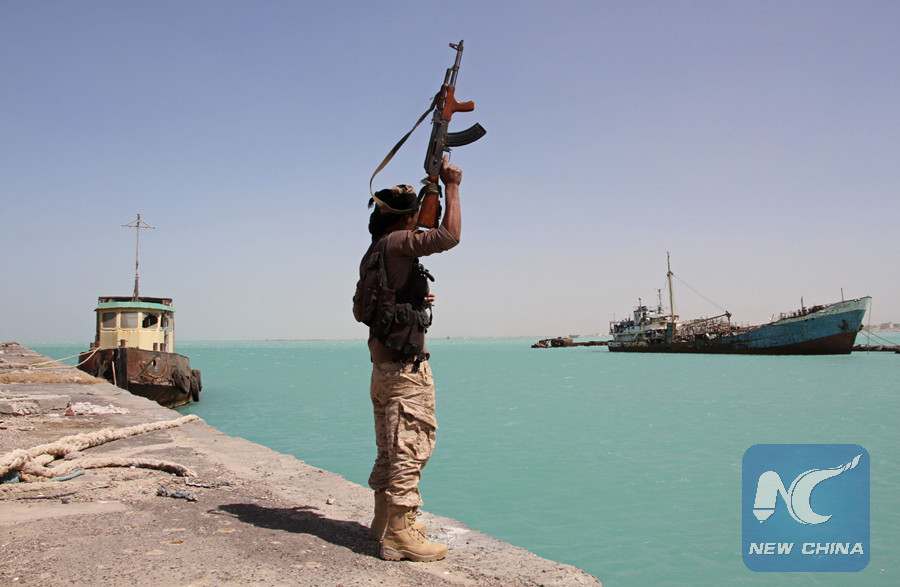
A member of the pro-government forces raises his weapon in the port of the western Yemeni coastal town of Mokha on Feb. 8, 2017, as the Saudi-backed troops advance in a bid to drive the Shiite Houthi rebels away from the Red Sea coast. (AFP File photo)
ADEN, Yemen, July 26 (Xinhua) -- The attack on two of Saudi Arabia's giant crude carriers west of the Yemeni port city of Hodeidah, for which the Houthi group claimed responsibility, sparked wide condemnation.
The two oil tankers belonging to the Saudi National Shipping Company, each carrying 2 million barrels of crude oil, were attacked by Houthis in the Red Sea on Wednesday morning after crossing the strait of Bab el-Mandeb, according to the Saudi-owned Al Arabiya television.
Yemen's Vice President Ali Mohsen described the Houthi attack as a deliberate terror attack aimed at disrupting the maritime traffic.
Mohsen pointed out the Houthi militia's repeated attacks against oil tankers in the international waters are an obstruction to the efforts that the UN special envoy for Yemen Martin Griffiths is exerting to bring about peace.
The Iranian-backed Houthis are "posing a threat to the regional and global security by seeking to use Hodeidah's seaport as a launchpad for their numerous terrorist operations," the vice president said in a statement revealed by official Saba news agency.
The internationally-backed Yemeni government strongly condemned the attack and urged the international community to support the ongoing military operations aimed at liberating Hodeidah from Houthis.
The threats to the movement of navigation and the international trade will increase as the Houthis are still in control of Hodeidah and its strategic port, according to a statement issued by the government.
The statement added that while the UN envoy is making "tireless efforts" to resume the peace process in Yemen, the Houthi militia carries out terrorist military operations aimed at undermining the efforts and proposals, which is "clearly evidenced" in the recent attack on the Saudi oil tankers.
A number of countries and regional organizations, including the Arab Parliament and the Organization of Islamic Cooperation, condemned the attack on the Saudi oil tankers.
The United Arab Emirates (UAE) Minister of State for Foreign Affairs Anwar Gargash said on his Twitter account that targeting the two Saudi oil tankers in the Red Sea by Yemen's Houthi rebels "confirms the need to liberate Hodeidah from the Houthi militias."
The Saudi coalition forces to which the UAE armed forces belong on Wednesday foiled another attack on a Saudi oil tanker in the Red Sea by Houthi militia, according to Al Arabiya television.
The Houthi attack forced Saudi Arabia to suspend all shipments of crude oil passing through the Strait of Bab El-Mandeb until navigation becomes safe.
Other neighboring countries are studying whether to halt oil exports through the strait, which connects the Red Sea to the Gulf of Aden, following the Houthi attack.
The Saudi-backed government of President Abd-Rabbu Mansour Hadi had expressed their readiness to return to the negotiating table during two meetings with the UN envoy in the southern port city of Aden late in June.
However, the Houthis escalated the situation later and fired several ballistic missiles against government-controlled areas in Hodeidah and used Iranian-made drones to launch attacks against headquarters of the Saudi-led coalition forces in Aden.
On June 13, the coalition declared a major assault to recapture Hodeidah and the Yemeni western Red Sea coast from the Houthis.
Yemen's government and Saudi Arabia have repeatedly accused the Houthis of using the port to smuggle Iranian weapons. Both Houthis and Iran denied the accusation.
Humanitarian agencies have warned of any attack on the port, saying it would lead to the world's biggest humanitarian catastrophe in modern history.
Hodeidah is the single most important point of entry for food and basic supplies to Yemen's northern provinces controlled by Houthis, including the capital Sanaa.
The United Nations reported that more than 121,000 residents have fled the war-torn city of Hodeidah and other parts of the province since June 1.
The coalition intervened in Yemen's conflict in March 2015 to roll back the Houthi rebels and reinstate Hadi.

